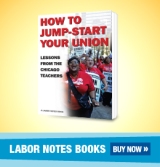America’s Union Suppression Movement (And Its Apologists), Part Two
 Leo Casey on April 18, 2013
Leo Casey on April 18, 2013
This is part two of a two-part post. The first part can be found below.
As the war against American unions reached a fever pitch in recent years, there emerged a small group of right-wing academics and think tanks that have taken up the anti-union cause in intellectual circles. Of particular note for our purposes are Terry Moe’s book, Special Interest, and a recent study, How Strong Are U.S. Teacher Unions?, which was jointly sponsored by the Fordham Institute and Education Reform Now. [6]
Since I’ve already written a critique of Moe’s book for the American Political Science Association’s journal, Perspective on Politics, my focus here is mainly on the Fordham/ERN report.
Both publications tell a very similar story (all the more remarkable given the political and economic context I discussed in Part I of this post), in which incredibly powerful teacher union Leviathans invariably win the day in all manner of educational and public policy fights. The Fordham Institute’s Michael Petrilli offered a ten-second sound bite for this meme, when he recently wrote that teacher unions “were the Goliath to the school reformers’ David.”
How does one find one’s way to such an unfounded conclusion? With an ideological analysis that has only the thinnest veneer of social science.
Take the most basic issue in this narrative, the supposed “power” of teacher unions. As I used to teach my Political Science students, power can not be understood as a static, fixed property possessed by an individual or a group, but must be seen as a relationship among various players. Like any other political actor, a teachers union possesses no power in the abstract, but only in relation to other parties – school districts; school boards; state education departments; county, state and federal governments; corporations; political parties; parents groups; and so on, across the field of education policy players. Yet, in discussing the power of the “Goliath” teachers union, Moe and the Fordham/ERN report make no mention of the greater relative power of the education reform “David.” This omission is telling for three important reasons: Continue reading →
Filed under: Busting the union busters, Labor History, Politics | Tagged: Education reform, Greenlight Capital, Michelle Rhee, New York City, New York State United Teachers, StudentsFirst, United States, Walton Family | 1 Comment »



 Conservatives have created the myth of the ‘micro-union’ in a direct attack on worker organizing around the country.
Conservatives have created the myth of the ‘micro-union’ in a direct attack on worker organizing around the country.






